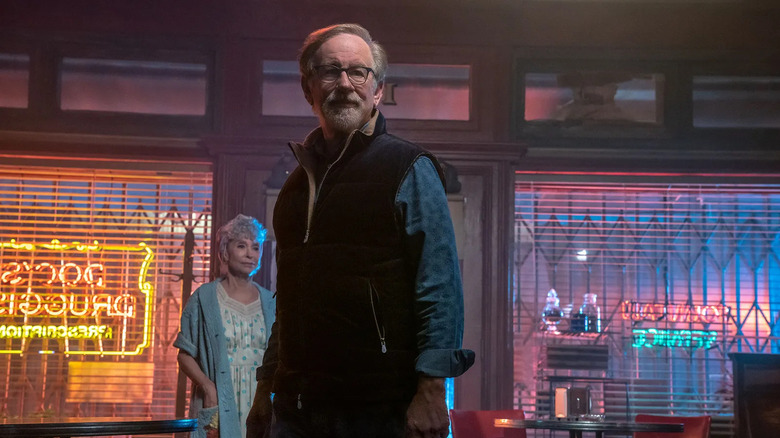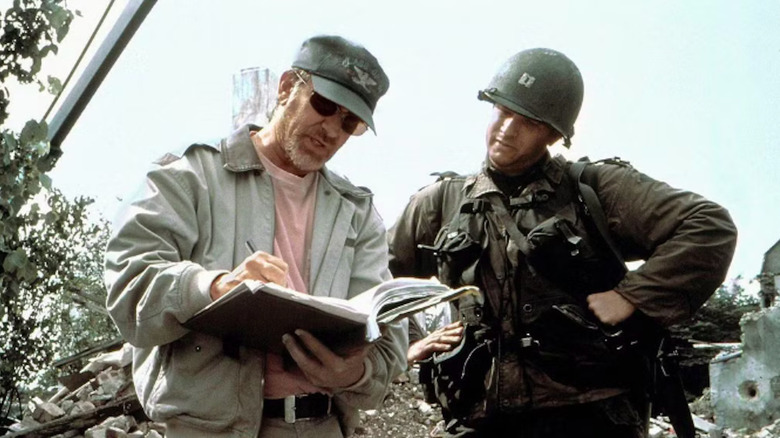Steven Spielberg Thinks One Aspect Of Filmmaking Is More Important Than Movie Stars
Steven Spielberg has been able to call his shot for the vast majority of his career. Ever since he directed "Jaws" in 1975, which was then the highest grossing movie of all time (a record it held for two whole years until the arrival of George Lucas' "Star Wars"), Spielberg hasn't had to work too terribly hard to secure the budgets, talent, and whatever other resources he needs to make whatever it is he wants to make. So it's fair to say that his filmmaking process is radically different than just about everyone else's — Christopher Nolan is probably the only other director who gets to play in Hollywood's sandbox with this kind of financial and creative freedom nowadays.
So while Spielberg possesses a wealth of information when it comes to filmmaking craft, it's important to note that his pointers on how to get a film made in 2024, and what to prioritize, come from a place of extreme privilege. This is, obviously, not a knock. The man richly deserves his success and stature. It's just been a long time since he had to scrap. So if you're a young filmmaker, it's best to read what I'm about to share below as aspirational. You want to get to a place where you can think this way, but, trust me, you ain't there yet.
And this is sad because, in theory, everything Spielberg says here is absolutely right and the way it should be for everyone.
For Spielberg, the screenplay is the star
In a 2013 interview with the Economic Times, Spielberg's questioner noted that his movies have never been star dependent. Yes, he's worked with major stars in the past (e.g. Tom Cruise, Harrison Ford, and Robin Williams), but the movies were not star vehicles. They were Spielberg transports that whisked audiences off to whatever world the director had built for each specific project. As Spielberg told the ET (please don't skip past the "the" there), "For me, it is the screenplay that is the star. All of us are in service of that story and the point is to tell it in a dynamic and colourful way."
Spielberg then launched into a bit of a history lesson as it relates to his process, and it's one that you should absolutely read:
"In the old days, when the studio system was more powerful than it ever was — in the golden days of Hollywood, i.e. the 1920s to 1950s, when the studio chiefs dominated the business — they cultivated super stars and they tailored stories for those stars. My generation has done the opposite, we found good stories and we cast the right people to play the characters and I still work with stars. Tom Hanks did 'Saving Private Ryan', but he will tell you that he [does] not come first. It was the script that came through first, Tom was perfect to play Captain Miller. I thought so, he thought so. Likewise, Leonardo DiCaprio was chosen after 'Catch Me if You Can' was scripted. I have never written a story to fit the actor, to fit the icon, I have never done that."
You might think "Lincoln" could be the outlier here, but that film was long in development with Liam Neeson (who backed out because he felt he was ultimately wrong for the part). So, in a sense, Daniel Day-Lewis, whom many people believe to be our greatest living actor, was Spielberg's second choice for the Great Emancipator.
This is an insane luxury, one that, in a perfect world, would be available to all. But most directors, even very successful ones like Quentin Tarantino and Martin Scorsese, have to come to the table with loads of star power to lock down the financing they need to make their specific kinds of cinema. For everyone not named Spielberg or Nolan, the star is still the star.

